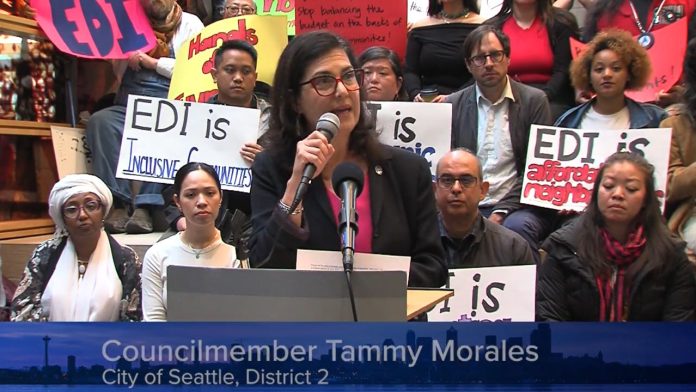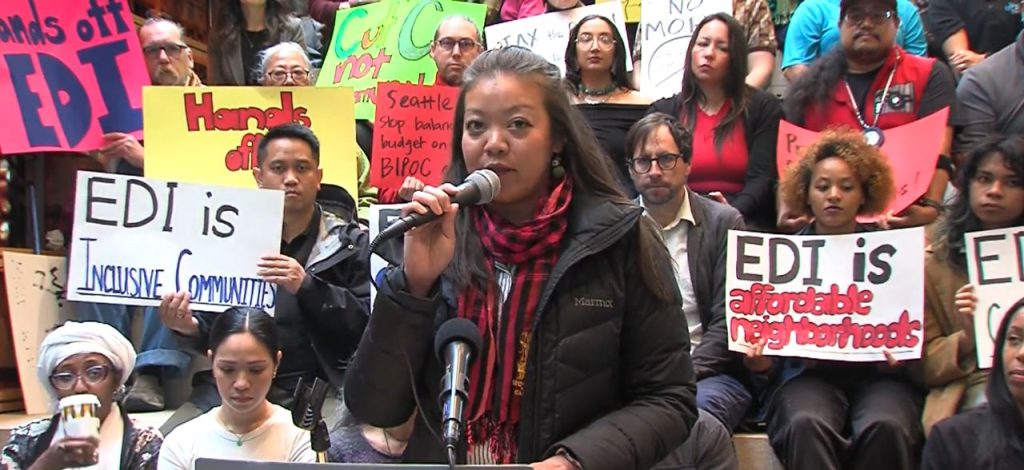
After facing considerable pushback last week, Seattle City Councilmember Maritza Rivera walked back her push to freeze $25.3 million in Equitable Development Initiative (EDI) funds within the coming months. Rivera’s earlier budget proviso would have clawed back this year’s funding awards for EDI projects if more than $53 million in past awards could not be spent down within three months, but she rewrote her amendment to remove that condition.
New reporting requirements on projects and instructions for the Office of Planning and Community Development (OPCD) to carry out a program evaluation by September 24 — the heart of budget season — remained in the legislation. Council passed Rivera’s revised amendment by a 8 to 1 vote Tuesday, with Councilmember Tammy Morales the sole no vote, arguing the evaluation was half-baked and rushed.
“I don’t disagree that an evaluation of EDI could determine the long term effectiveness of this program, particularly as an anti-displacement strategy. In fact, I welcome the chance to do that. But that kind of program evaluation has to be carefully planned and carried out, not thrown together in just a few weeks, 90 days,” Morales said. “For an evaluation and reporting timeframe is just as harmful, even if the language doesn’t explicitly call out for a reduction of funding. And it’s unclear what councilmembers who are requesting this information will do with it.”
Despite reworking her amendment, Rivera continued to claim the original proposal was fine and that the criticism she faced was the result of critics spreading misinformation. Following the underlying bill’s removal from last week’s council agenda, Rivera even went so far as to accuse the press of “disinformation,” i.e. a deliberate effort to mislead, without naming any outlets or reporters individually — not to mention her colleague Morales, who also put out a call to action email.
“I will say as a woman of color, it really pains me when community is pitted against each other in such a way,” Rivera said. “And I think it was really unnecessary in this instance, because the funding was never at issue.”
A group of nonprofits and advocacy groups held a rally and press conference on Tuesday morning, pushing the city to defend EDI funds. Representatives from several of the 56 EDI projects in progress noted the process is complicated and time-consuming to secure land, funding, permits, and break ground on a project. Several speakers disputed Rivera’s framing, saying they understood what she was trying to do all too well.

Explaining how her earlier proposal to freeze funding was not a big deal, Rivera said that OPCD could have requested a carry forward of funds for EDI participants that failed to spend down their funds in three months due to complications with their development proposal, which Puget Sound Sage and other EDI coalition members said average eight years to complete.
“As I said last week, the ongoing EDI projects were never at risk,” Rivera said. “OPCD could have asked for a continued carry forward next year for any amount they didn’t spend this year. But I understand that stakeholders needed a strong message of support for the program, which is why I withdrew amendment.”
Councilmember Bob Kettle backed up Rivera’s claim that the $25 million was never at risk, and he pledged that the program had his full support. Likening the EDI pushback to criticism he faced for reforms he was considering for police recruiting standards, Kettle argued Seattle residents were too critical of their city council.
“So where does this miscommunication or disinformation originate from or how does it get pushed? I don’t know,” Kettle said. “Some may say this is politics, but I think it contributes to the lack of civility. I think it contributes to the lack of the ability to have a full public discourse on the issues that face the council and I think that we should be looking to do better.”
With Seattle facing a $258 million budget deficit, supporters of the EDI program were worried that it would on the chopping block during fall budget-balancing season. Despite walking back her raid, Rivera and her colleagues have not allayed those concerns, which Morales continued to raise.
“I don’t object to an evaluation of this program, but this amendment seems to suggest that its real purpose is to serve as a pretext for defunding the program before an authentic evaluation and audit can be performed,” Morales said. “And that does not serve our goals of anti-displacement or good governance or fiscal responsibility. It just serves to harm communities of color by eliminating critical funding for community-led projects.”
Making a pitch for fully funding the EDI program amid a major budget shortfall, Morales noted it’s one of the few funding sources to acquire land in communities of color facing high displacement pressure, such as the Chinatown-International District (CID).
“Right now there are five or six buildings in the CID that are for sale,” Morales said. “This creates the historic opportunity to secure buildings for ownership of land, and EDI funds help with that kind of acquisition to maintain properties for the public good to preserve affordable housing, or convert to homeownership opportunities. Eliminating this program funding means there are virtually no other funding sources to help nonprofit groups and the City to jump on these kinds of opportunities. And without public funding to support EDI acquisition. We’re all very likely to see more speculative developments we’ve been to the CID and other communities of color.”
At the Tuesday morning rally, K. Wyking Garrett, who is president and CEO of Africatown Community Land Trust, painted the attack on EDI funding as jeopardizing progress on issues of racism in Seattle.
“Many of these projects are Black-led projects, which are projects which are striving to make sure that our community is a part of the future of this city as we have been a part of it for over 140 years,” Garrett said. “So there has to be a significant policy direction back to the status quo of Jim Crow apartheid in Seattle.”
Garrett and other Black, Indigenous and people of color (BIPOC) community leaders raised issues of community erasure and displacement, which the EDI program was intended to address.
“The question to ask is, is it one Seattle for us too?” Garrett said. “Is it One Seattle: a world class city that’s inclusive of the communities of the world that have made this city, or is there one-class Seattle? This is really what is at stake.”
Doug Trumm is publisher of The Urbanist. An Urbanist writer since 2015, he dreams of pedestrian streets, bus lanes, and a mass-timber building spree to end our housing crisis. He graduated from the Evans School of Public Policy and Governance at the University of Washington in 2019. He lives in Seattle's Fremont neighborhood and loves to explore the city by foot and by bike.

